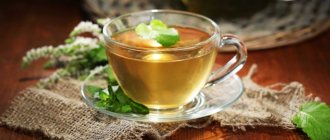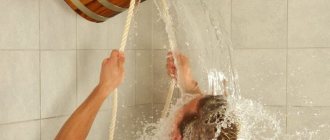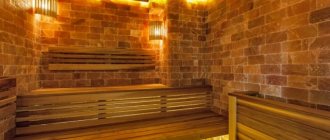One well-known expert in the domestic bath business, when asked what to drink in the bathhouse, invariably answered: “Exclusively moonshine made from sugar beets or molasses, and certainly warm, moderately carbonated from a carbon dioxide cylinder of a semi-automatic welding machine and always from an aluminum mug filled to the brim . Naturally, you need to take the life-giving elixir before each visit to the steam room,” and after a significant pause, he added: “in order to fully experience the feeling that this trip to the bathhouse could be your last.” But let's not talk about sad things. There are a lot of worthy drinks around that are worth our attention. Shall we taste it?
Is it possible to visit the bathhouse after a long feast?
Often after noisy events (corporate parties, birthday celebrations), many continue the fun in the bathhouse. Sometimes people deliberately do this, citing the fact that the steam room expels alcohol from the body in a matter of minutes. I will say right away that doctors do not recommend taking alcohol before a bath and steaming while intoxicated.
The reasons are as follows:
- In the first hours, the effects of alcohol and hot steam on blood vessels coincide - muscle relaxation and vasodilation occur;
- The heartbeat reflexively increases;
- Blood supply to the brain decreases.
As a result, blood accumulates in the peripheral capillary bed. The brain experiences oxygen starvation, which leads to loss of consciousness and fainting. There is an opinion that a good snack slows down the absorption of alcohol, but after eating the volume of the vascular bed of the stomach increases, this increases theft of the brain. Therefore, you should not drink alcohol before the bath, and doctors also advise you to refrain from a heavy snack.
Consequences of drinking beer before a bath
Scientists studying the problems of alcoholism do not consider beer a harmless drink. Professor Bohlinger (Germany) has established a direct relationship between heart disease and beer abuse. If you drink beer in a bathhouse, the following processes occur:
- Cobalt is used to stabilize beer foam. After drinking a glass of foamy drink, the heart muscle receives a portion of a toxic element that exceeds the established norm by 10 times.
- A drink saturated with carbon dioxide quickly fills the blood vessels, disrupts blood flow, and causes dilation of the veins of the lower extremities.
- The heart increases in size and arrhythmia occurs, negatively affecting the hepatic artery. These injuries are especially life-threatening.
- After research, cardiologist at the Mayo Clinic (USA) Virend Somers concluded: even a moderate dose of alcohol lowers blood pressure. When visiting a bathhouse, high temperature in tandem with small degrees of alcohol will definitely increase your blood pressure. A person who drinks beer before a bath becomes vulnerable. A surge in blood pressure is especially dangerous for hypertensive patients.
- Ethanol and other harmful substances from beer enter the bloodstream and contribute to bloating of the intestines, which tend to relax during bath procedures.
A doctor of the highest category, psychiatrist-narcologist A. Kazantsev warns: it takes a long time to remove 500 ml of beer from the body. So, with a body weight of 70 kg it will take 3.5 hours; with a weight of 90 kg - 2.5 hours. Thus, beer drunk on the eve of visiting the bathhouse will reduce the benefits of the health event to zero.
Is a bottle useful in a bath?
Traditionally, it is not recommended to bring alcohol into the sauna. Alcohol intoxication in a sauna leads to dangerous and sometimes fatal consequences:
- Firstly, dilation of brain vessels due to overheating can lead to rupture of the vessel and cause hemorrhage in the brain.
- Secondly, the sharp temperature change that occurs when doused with cold water after a sauna leads to vasoconstriction. Such actions can lead to the detachment of a blood clot and cause sudden death from arterial thromboembolism, heart attack or stroke.
- Thirdly, increased evaporation of vapors from the respiratory tract increases the concentration of alcohol breakdown products (fumes) in the air, causing repeated toxic effects.
- Fourthly, alcohol increases the load on the heart: heartbeat increases, shortness of breath appears.
- Fifthly, injuries in the bathhouse due to intoxication lead to fractures, dislocations and head injuries.
Now let's figure out how alcohol affects vital systems. In a sauna environment, the influence has its own characteristics.
What can you drink in the steam room?
Advice about the benefits of drinking non-alcoholic drinks when visiting a bathhouse or sauna is a harmful invention. Recommendations to drink tea with aromatic herbs, juice, homemade kvass, and decoctions are considered healthy and necessary drinks. Evidence-based medicine has established that you should not drink anything in the bathhouse. The body will instantly remove any liquid through the sweat glands. The expected benefit will turn into increased stress for the endocrine glands and organs.
You are allowed to drink a small amount of mineral water or a little juice.
Effect on the urinary system
The liquid in the steam room is released from the body along with sweat through enlarged pores. The kidneys temporarily stop producing urine. The product of ethyl alcohol processing (ethyl aldehyde) is not excreted, but accumulates in the blood, causing a toxic effect: headache and vomiting.
All of the above also applies to such a seemingly harmless drink as beer. This is due to the following reasons:
- Beer contains ethyl alcohol;
- The small percentage of alcohol is compensated by the impressive volumes consumed;
- Beer together with high temperature causes functional disorders and flatulence.
Therefore, when going to the bathhouse, I will think carefully: do I need alcohol in the bathhouse, is it worth spoiling my impression of the holiday and harming my health.
Alcohol will not improve your health
The culture of visiting a bathhouse itself involves spending sober time, cleansing the body physically and morally, removing toxins and metabolic products, and ultimately liberating yourself from unpleasant thoughts and the negativity that you cannot do without in life.
Alcohol, of course, allows you to relax, but if alcohols are unsafe when consumed under normal conditions, then they certainly will not help you improve your health in a bathhouse. Therefore, if you want to have a cultural and beneficial time for your health and have a good rest, give up alcohol, and if you cannot relax without it, then go to a cafe or restaurant - do not burden your body with exposure to high temperatures.
Is alcohol good for you after a bath?
It is known that the sauna has a healing effect on the body: pores open, sweating increases, toxins are removed, and microcirculation improves. As a result, the body is cleansed, the skin acquires freshness, elasticity and a pink tint.
Taking a portion of alcohol after a bath in small doses (30 ml of strong drinks and 200 ml of wine) will not cause much harm to the body, but exceeding the amount will cause intoxication, which completely negates the benefits of the bath.
After a bath, a reflex vasoconstriction occurs, which increases resistance in the peripheral arteries. Therefore, hypertensive crises are possible, which are not so easy to stop. Alcohol breakdown products act similarly: they increase the formation of adrenaline. This substance directly acts:
- on blood vessels, causing them to spasm;
- on the heart, increasing heart rate;
- on the brain, increasing the need for oxygen;
- kidneys, disrupting the excretion of harmful substances by the kidneys.
The body works in extreme mode; if there are chronic diseases, their exacerbation occurs. A sudden development of a heart attack is possible, with fatal outcomes.
To drink or not to drink
So, is it possible to drink alcohol during bath procedures? It is quite natural that no one can prohibit adults from drinking alcoholic beverages in the bathhouse or immediately after it. However, having decided to combine bath procedures with friendly gatherings, you should remember that alcohol not only negates all the benefits of a bath, but also causes irreparable harm to human health and reduces the vitality of the human body.
Thus, it is worth separating the flies from the cutlets, and separating the bath and drinking alcoholic beverages. Otherwise, the consequences could be dire.
The basic principle of a healthy bath
Most of us visit the bathhouse to relieve nervous tension that has accumulated during the work week, to cleanse the body not only from the outside, but also to remove toxins through increased sweating. The healing effect is not achieved if alcohol is consumed after the bath or before the sauna.
It is better to do without alcohol in the bathhouse. Health benefits will come from drinks based on natural ingredients: kvass, herbal teas with honey. It is better to combine a sauna with a contrast shower and massage. And then in the morning you will not be bothered by a headache, but will be filled with a feeling of lightness and freshness.
With that, let's say goodbye, until our next meetings. Use the healing properties of the bathhouse for your benefit!
Best regards, Pavel Dorofeev.
Breaking stereotypes
During bath procedures, the body actively loses moisture and salts, which simply vitally need to be replenished in order to restore the water-salt balance as quickly and efficiently as possible. So you need to drink. What to drink, when and how much is not entirely clear.
The Internet is good for everyone, except for one thing. Some “specialist” will write downright nonsense, either out of stupidity, or for the sake of humor, and off we go. Dozens of “authoritative experts” pick up the idea from the “original source” and, twisting it in different ways, spread the “knowledge” throughout the network, like stray dogs, garbage from a container all over the street. At least take some beer in the bathhouse. We wrote about it in detail at one time. Comrade experts, why so categorically assert that it is an absolute evil and incompatible with a proper bathhouse. The question, perhaps, is not about the “right” bath, but about the “right” beer and the time of its use. The southern federal states of Germany respect beer as a traditional and deservedly revered drink. Excuse me, the Germans are literate and sensible people, they don’t completely refuse to drink a foamy drink, it’s all a matter of quantity, quality and general culture. Or the Finns. Well, who can argue with them on bathing issues? And in Finland, beer, as paradoxical as it may sound, is the most popular drink for the sauna. And we also did not hesitate to mention this when we wrote about how to properly go to the sauna. If anyone doubts the competence of the correct actions of the Finns, Swedes or Germans, then you should just look at their pensioners and compare them with ours. And if by the age of 80 they had not squandered their health, but rather vice versa, then, obviously, not everything is so simple.
Let's repeat. You can’t put real, properly prepared beer under a taboo and deny yourself a little pleasure. The main quality, measure and culture of its use. Let's go further…
Black, green, herbal teas
We have already talked in detail about tea and the place it occupies in the classic bath tradition. Let's repeat briefly but succinctly:
- Black tea is an imported product, and in order for it to be beneficial or at least not harmful, you need to be sure of its impeccable quality. Careless manufacturers and importers often supply a product in which third-rate raw materials are seasoned with synthetic substances that simply stimulate the body, causing a feeling of vivacity and a surge of energy. But this works at the level of applied pharmacology, and not the most harmless one;
- Green tea is in many ways similar to its black relative, both in application and in origin, so an informed choice of product is everything to us;
- Herbal teas are bath drinks that are available, and their preparation, as well as the collection of raw materials, can be done independently. It is obvious that herbal medicine, as a method of influencing the body, is a very subtle and delicate science, therefore, in order not to cause harm, you need to avoid preparations with a pronounced clinical effect, observe moderation and always focus on your well-being. If you feel discomfort, switch to a different tea or give it up altogether.
Important! When collecting yourself, focus on plants that are well known to you and have a mild, delicate effect: linden inflorescences, currant leaves, raspberries and cherries. Avoid growing areas located in close proximity to busy highways.
Fruit and berry decoctions and infusions
The choice of drinks of this kind is extremely wide and varied, and traditional recipes for the bath have been known for centuries. Unlike herbal tea, they do not have a pronounced therapeutic effect on the body, therefore, they can be consumed in much larger quantities. The main drinks that are in enviable demand when deciding what is best to drink in a bath include:
- Rosehip decoction with honey. The fruits of this prickly plant are extremely rich in vitamin C, therefore, its use can guarantee to cover the daily requirement for ascorbic acid without the use of additional sources of the vitamin. Honey will help balance the taste of the decoction; on the other hand, it will provide the body with the need for quick energy. It’s no secret that bath procedures are quite a serious test for a person, including in terms of energy costs;
- Raspberry fruit decoction. Possessing an excellent taste, this berry has restorative and diaphoretic properties. The ability of raspberry tea to fight colds has already become a legend. You can somewhat enhance the diaphoretic qualities by adding crushed raspberry leaves to the decoction, in a ratio of 1 part leaves to 6 parts fruits. It is worth saying that you can use not only fresh berries, but also dried and fresh frozen ones;
Attention! The tea we are so familiar with, with raspberry jam, is not so good when it comes to solving the question of what to drink in a bathhouse for health. First, the fruits are subjected to deep heat treatment; after all, the jam is boiled. As a result, the raw material loses almost 80% of its original composition of useful components. Secondly, jam is preserved with sugar, and sugar and health are incompatible things.
- A decoction of black currant berries. Another record holder for the content of microelements and vitamins, of which, in particular vitamin C, it contains more than the standard lemon. Blackcurrant, in itself, is a very aromatic berry, but a simple trick will help make the drink even more fragrant and give it a touch of piquancy. Before brewing, the berries should be thoroughly crushed in a porcelain mortar and allowed to stand for 30 - 40 minutes. And immediately, before cooking, you need to add 1 part of fresh or dried currant leaf to 5 parts of berries;
- When discussing what you can drink in a bathhouse without much damage to your figure, it is worth recalling the decoctions of apples, pears and other garden gifts. In the first place, of course, are apples, since they are the most balanced in terms of carbohydrate content, the main suppliers of extra centimeters for the waist. A decoction of pears looks like a heavier drink; nevertheless, they are more saturated with polysaccharides. And, probably, you should completely stop making plum drinks. In everyday life, this is an excellent raw material in all respects, but after bath procedures or directly during their use, it is better to refuse such a decoction. Obviously, all decoctions are produced according to a few simple rules. The raw materials must be well crushed, the ratio of water and fruit should be within 1: 4 by weight, the broth is brought to a boil, but not boiled, sweetened with honey, but not sugar, in an amount based on personal preference. Practice shows that drinks of this type perfectly quench thirst and restore water balance. It is better to consume them warm, within 40 - 45 degrees Celsius. That’s right, flavor pallets better reveal the fruity taste and bouquet of these simple, but very healthy and pleasant drinks in all respects.
Revitalizing herbal tinctures and decoctions
Herbal teas, tinctures and decoctions are another category of equally popular drinks that can be drunk in a sauna or bathhouse. It features drinks made from medicinal herbs and berries.
Herbal tea for baths is absolutely not inferior to traditional teas in its healing characteristics. Such mixtures contain a large number of active components that help replenish water balance and improve the biochemical parameters of the body.
Thus, the most popular are teas brewed with field herbs - chamomile, thyme, lemon balm, mint and St. John's wort. Also used are flowers, leaves of shrubs and trees - linden, raspberry, viburnum, rose hips, strawberries, blackberries, elderberries and blueberries.
When using medicinal herbs, what tea is best to drink in a bath?
- Tonic tea. It restores strength well and energizes. To prepare the drink, blueberry, strawberry, lingonberry and wild strawberry leaves are used, as well as rose hips.
- Soothing tea. Affects the central nervous system and muscles, relieves fatigue and irritability. Chamomile, lemon balm, mint, St. John's wort and oregano are used for brewing.
- Breast tea. Good for diseases of the lungs and bronchi, eliminates prolonged cough. The main ingredients are coltsfoot leaves, plantain and licorice.
- Sweatshop tea. Used to quickly warm up the body and increase sweating. Sudorific bath tea can be prepared from linden and raspberry inflorescences.
Invigorating berry juice
If you like sour drinks with a pronounced berry note, then fruit drinks are the best choice. They are prepared from natural wild berries: lingonberries, cranberries, blackberries, strawberries - and contain a large amount of vitamins and beneficial microelements.
The record holder for the content of vitamins C and PP is cranberry juice. It normalizes blood pressure, relieves fever, quenches thirst, and improves immunity. In addition, cranberries are rich in flavonoids - natural antioxidants that protect the body from the effects of pathogenic microflora and prevent the development of malignant tumors.
Cranberry juice is a powerful tool in the fight against heart attacks, strokes and cholesterol plaques in the blood vessels.
Refreshing bread kvass
Kvass is one of the most popular drinks that can be consumed after a bath. It perfectly quenches thirst and gives vigor after a hot steam room. Kvass is consumed chilled and has a spicy taste, thick foam and bready aroma. If desired, you can prepare it yourself at home.
A simple recipe for bread kvass
Black bread is cut into cubes and dried in the oven until crispy. Place the crackers in a deep container and pour boiling water over them, leave for up to 3 hours.
Strain the bread wort into an enamel pan through a piece of gauze, add diluted yeast and sugar and cover with a clean towel. Leave to ferment for 14 hours.
The fermented mass is filtered into bottles, 3-4 raisins are added (per 0.5 liter container) and closed tightly.
The liquid is kept in the room for a couple of hours and then put away in a cool place.
For 5 liters of clean water: 500 g of crackers, 100 g of sugar, 10 g of yeast, 20 g of raisins.











